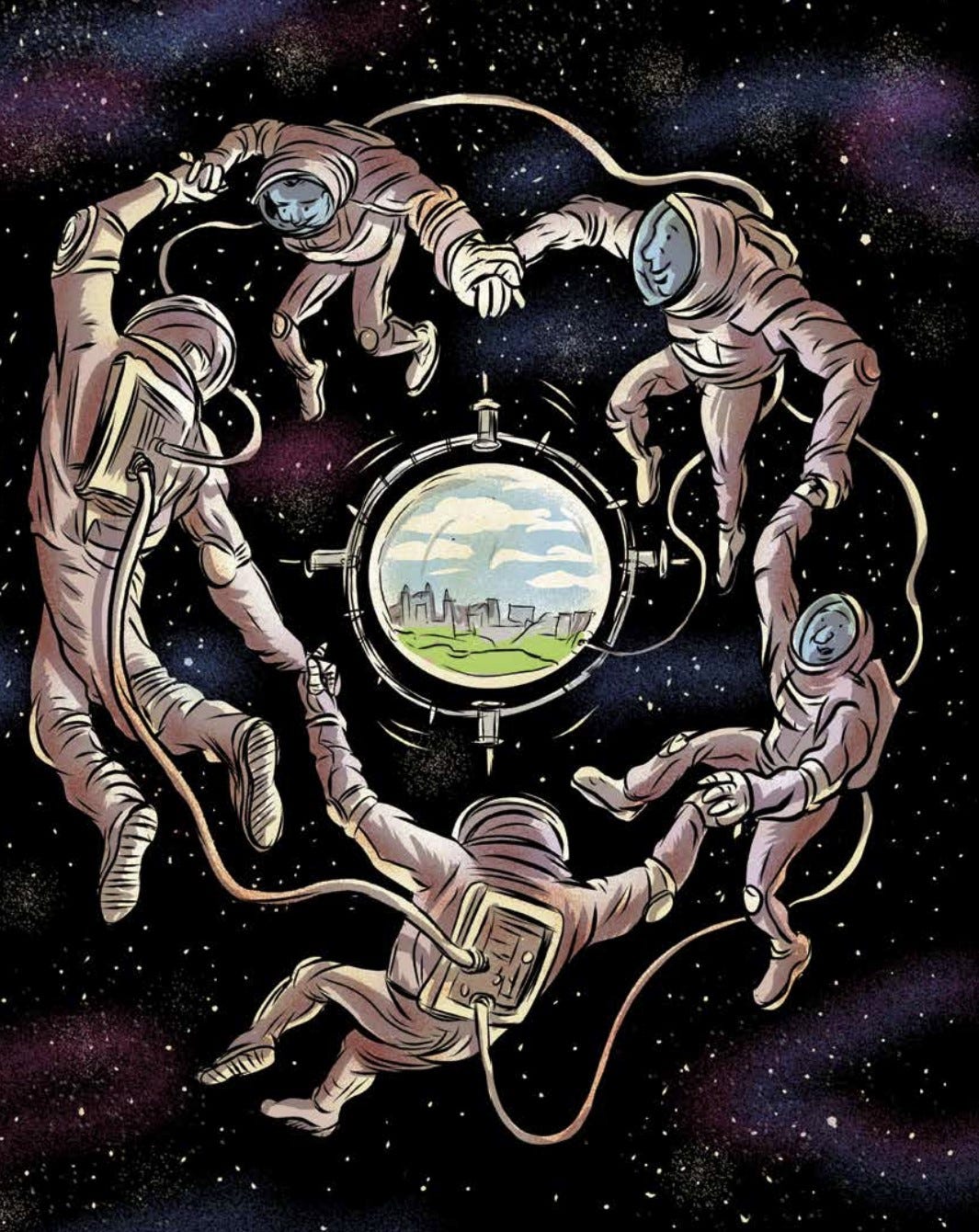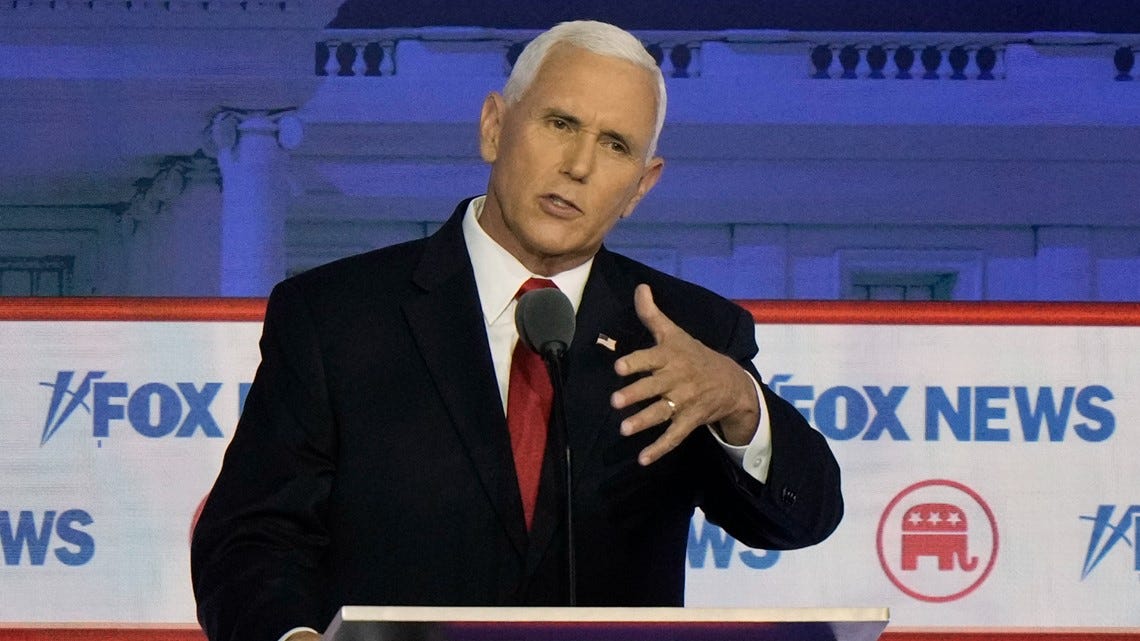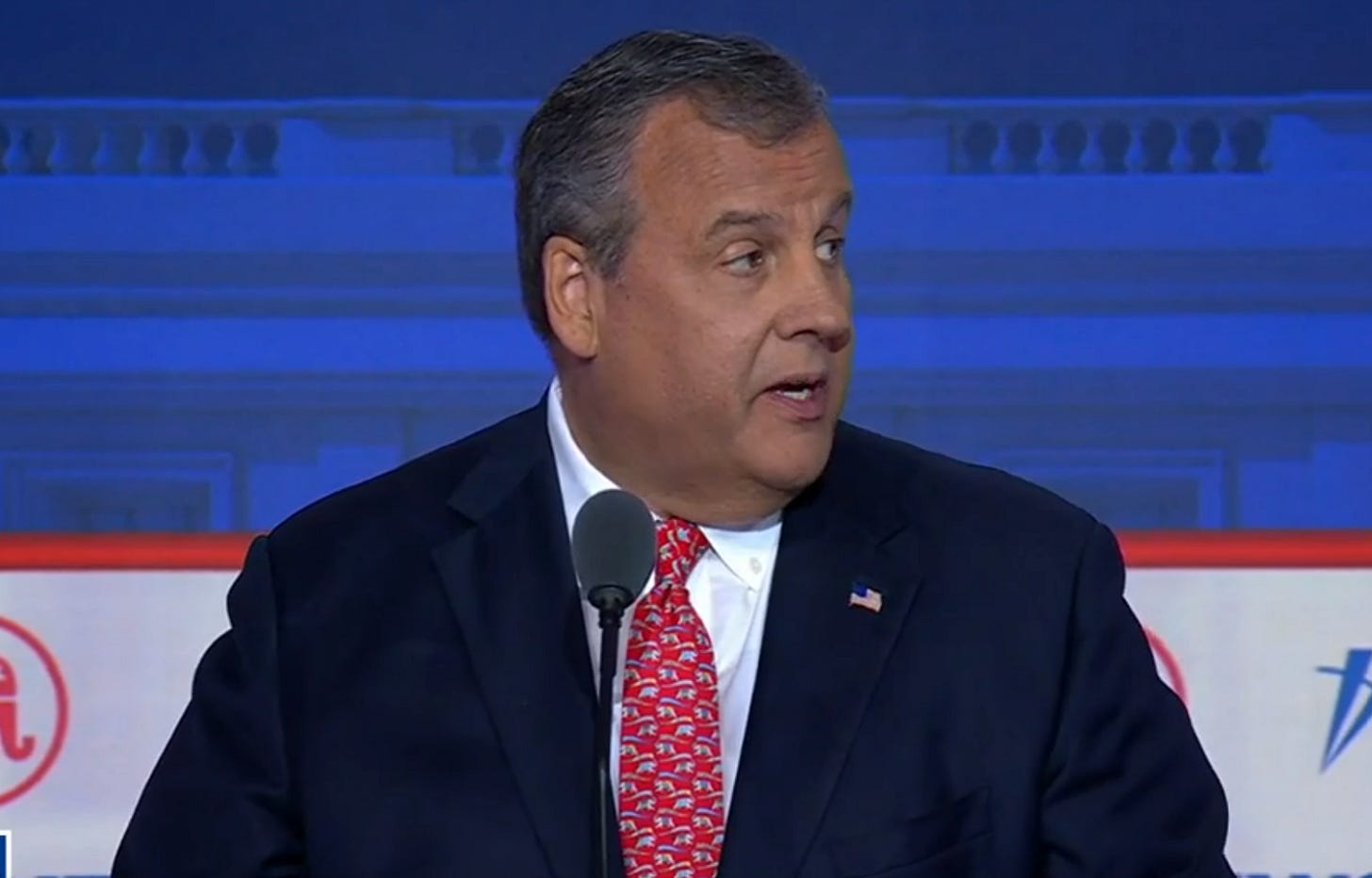Aug. 25, 2023 ❧ A demon symposium in Milwaukee, Ecuador vs. Big Oil, Educational Intimidation, and Prigozhin's timely demise...
plus India goes to the Moon, unionizing Trader Joe's, Vox's student loan shill, and more...
Thank you to those of you who have already donated to help us furnish our new office space! If you’d like to have a particular piece of office equipment named after you, email editor@currentaffairs.org with your requests. We’ll do our best to satisfy them, but if four people all want the coffee maker named after them, someone might have to settle for the fridge. At the end of today’s newsletter, you’ll find an exclusive first picture of our new office space! We are 100% dependent on reader support so do consider helping us out with attaining new equipment and furniture, with which we will continue to produce incisive political analysis and commentary. The more support we get, the higher the quality of our work can be!
Oh, and as always: email briefing@currentaffairs.org with story suggestions, irate grumblings of discontent, corrections, or just general greetings. We love hearing from all of our wonderful subscribers. AND NOW… The News!
STORIES THAT SHOULD BE BIGGER
ECUADOR VOTES TO END OIL DRILLING ON PROTECTED AMAZON LANDS
Last week, Ecuador’s people also overwhelmingly voted yes in a landmark referendum to stop state oil drilling in Yasuni National Park, a protected region of the Amazon rainforest. The area is home to two indigenous tribes, the Tagaeri and Taromenani, who live in voluntary isolation from the rest of society. The area is also a UNESCO World Biosphere Reserve and is home to 610 species of birds, 139 species of amphibians, and 121 species of reptiles.
Oil drilling in Ecuador’s Amazon has been subject to legal battles for decades, and has led to devastating consequences for the people and animals living there. For instance, in 2020, an oil spill engulfed more than 20,000 meters of Cayambe Coca National Park, which contaminated the water of 27,000 indigenous people downstream of the Coca River. Since then, the same company has constructed seven more pipelines in the area—all of which have collapsed. The Ecuadorian government has acknowledged a total of more than 1,200 oil spills over just the last decade. But the struggle stretches back decades. Infamously, Chevron was forced to pay $9.5 billion in damages to the people of Ecuador for dumping toxic chemicals into the Ecuadorian Amazon, which contributed to cancer and other diseases in perhaps as many as 30,000 people over three decades (The American lawyer who helped them secure the settlement, Steven Donziger, was then held under house arrest for nearly three years after being prosecuted for contempt by a team of lawyers paid by Chevron and a judge who had financial ties to Chevron. Chevron also never paid the money they owed to clean up the Amazon.)
Indigenous groups successfully pushed the referendum to end oil exploitation, which has polluted the water supplies of tribespeople and proven ruinous to the area’s biodiversity. Fighting oil drilling on indigenous lands has been a decades-long endeavor that has been met with violent repression, such as the government’s killing of activist Eduardo Mendúa, a forest defender who organized protests against oil companies entering Indigenous territory.

Following the decision, Leonidas Iza, President of the Confederation of Indigenous Nationalities of Ecuador, said,
The Ecuadorian people, mindful of life, in solidarity with our uncontacted Tagaeri, Taromenane and Dugakaeri brothers and sisters, said “Yes to Yasuní” in this referendum on August 20th. We have saved their territory, their lives, their food sovereignty, and their medicines in the sacred Yasuní forest,” In this little piece of territory in the heart of the Amazon, we can find solutions to problems that most affect humanity. Science has shown that the best protected territories in the fight against climate change are Indigenous territories. That’s why we invite the international community to lend a hand, in solidarity and sensitively, to protect the territories that balance the life of Mother Nature, which save species and also humanity.
Ecuador’s vote should inspire those around the world who are struggling to stop the use of fossil fuels and secure a livable future. We are not destined to lose. The supporters of the continued destruction of the planet can be fought and defeated.
NEARLY 400 "EDUCATIONAL INTIMIDATION" BILLS INTRODUCED OVER 2.5 YEARS
On Wednesday, PEN America released an eye-opening new report on the status of what they call “educational intimidation” bills in the United States. These are state-level pieces of legislation that, while they don’t explicitly ban particular topics or materials from public schools, “cast a chilling effect that creates the conditions for censorship indirectly, threatening the freedoms to teach and learn with death by a thousand cuts.” Educational intimidation happens when a set of rules is intentionally vague and broad in scope, so no one is exactly sure of what they can do or say without being punished. In Florida, for instance, the law may not explicitly name certain books as “banned” (yet, anyway), but it requires that any book available to students in a classroom or library be reviewed by a “specialist,” whose criteria for judging a text’s appropriateness are at best ill-defined. Rather than take a chance, educators wind up self-censoring, preemptively removing any material that could conceivably raise an objection. Other bills introduce what PEN America calls “new and intrusive forms of inspection or monitoring” to the school environment, making staff and students alike feel that they’re under constant scrutiny. One particularly insane Iowa bill, which failed to pass, would have installed video cameras in every classroom and allowed any tax-paying citizen to tune in online whenever they liked.
According to PEN’s data, 392 such bills have been introduced into state legislatures in the last two-and-a-half years, reaching all but four states. Of that number, all but 15 were sponsored exclusively by Republican legislators. Often, the language of “parents’ rights” is invoked, but this is deceptive; under the Family Education Rights and Privacy Act of 1974, more commonly known as FERPA, parents have always had the right to see their children’s school curricula, and file objections to anything they find offensive. Instead, the new laws allow the most extreme right-wing parents in a particular district to trample on everyone else’s rights, forcing the whole community to conform to their tastes and sensibilities. But there is a note of hope: according to a recent NPR poll, 69 percent of Americans are opposed to book-banning policies, including half of Republicans surveyed. By pushing the envelope as far as it can go, censorious lawmakers may finally overplay their hand, and meet real consequences at the ballot box.
[CORRECTION: The original version of this briefing incorrectly stated that a bill in Indiana “would have installed video cameras in every classroom and allowed any tax-paying citizen to tune in online whenever they liked.” This bill was actually proposed in Iowa. Thank you to our vigilant reader, Nick, for pointing out this error!]

REPUBLICAN DEBATE REVIEW
A CARNIVAL OF SOCIOPATHS
On Wednesday night, eight Republican presidential hopefuls met in Milwaukee to yell at each other for a couple of hours. The actual content of this debate is almost so perfunctory as not to warrant discussion. It was a Republican debate. All of the major policy questions (with the possible exception of whether we should go to war with Russia, China, Mexico, or all three) are settled: They all want to ban or severely restrict abortion, cut every social program under the sun, drill for oil forever until the end of time. Ron DeSantis said we need to invade Mexico and shoot people crossing the border—no one disagreed with him. Vivek Ramaswamy said we need to fire most federal employees and shut down the Department of Education—no one disagreed with him.
It was a horror show. It was exactly what we all expected. And as much as we’d like to pretend it was just a weird dream, it was a thing that occurred in politics. It, therefore, must be discussed in our political newsletter.
Because we respect our readers’ intelligence, we’ll spare you any guileless hot takes about how Vivek Ramaswamy may be having a Moment or the North Dakota governor’s well-articulated statements on energy policy may herald the start of “Burgum-mentum.” Unless Donald Trump (who chose to forsake the debate to hang out on a “live” stream with Tucker Carlson) goes to jail or dies between now and the 2024 convention, there is virtually no chance that any of these chuckleheads will sniff the Republican nomination.
Because this is Current Affairs, and not some publication for apple-polishing squares like the New York Times, we will not engage in the charade of attempting to “grade” these candidates based on their debate performance. Current Affairs is a magazine for adults, and we will tell you straight up that grades don’t actually matter.
It should be obvious at this point that a candidate’s elocution or policy knowledge on the debate stage has virtually nothing to do with their ability to be elected. The last two presidential victors—Trump and Biden—are arguably the two most senile, belligerent men in America (for proof, see their debate in October 2020 as Exhibit A).
This entire form of debate “journalism,” in which media dorks mine choice soundbites to extrapolate “winners” and “losers” of the debates, is an utterly farcical exercise (If you need any further evidence of this, look no further than the time CNN’s Chris Cillizza declared that Steve Bullock and John Delaney were “winners” of the first Democratic debate in 2019, or how a majority of the media declared Kamala Harris—who would drop out before the Iowa Caucus—to have been the big winner of the first debate she appeared in).

One should parse these candidates’ debate performances with roughly the same amount of scrutiny that they would parse the interplay between two gibbons hooting at one another. So: instead of giving these candidates ratings based on any subjective metric of “quality,” we will judge their debate appearance based on which wild animal they most resembled during their time on stage (We will refer to this as the “Maeby Fünke System,” in reference to the time the Arrested Development character received a “crocodile in spelling” instead of a letter grade from her new-age elementary school).
GRADING THE REPUBLICAN DEBATE PARTICIPANTS
MIKE PENCE, Former Vice President
He certainly took the prize for sliding his way out of answering the most questions—most notably turning a question about how much he raised the national debt while serving as vice president into an opportunity to talk about how awesome it is that Trump’s Supreme Court appointees overturned Roe v. Wade.
GRADE: HAGFISH
The slimiest creature known to man!
RON DESANTIS, Governor of Florida
In one of their better questions of the night, the Fox moderators actually asked the candidates point-blank—in the midst of an unprecedented summer of catastrophic weather events and the hottest temperatures on record—to raise their hands if they believed climate change is real. To bail all of them out of answering the question, DeSantis barreled into the conversation by whining, “Look, we’re not schoolchildren,” which conveniently threw the debate into disarray.
GRADE: STYGIMOLOCH
That dinosaur with the weird-looking head from Jurassic World who busts through the wall and saves everybody’s asses.
A HUMAN-STYLE SMILE FROM A HUMAN-STYLE MAN
NIKKI HALEY, Former U.N. Ambassador and South Carolina governor
Of all the candidates, Haley has been arguably the most open about her unquenchable desire to cut entitlements. She continued that crusade on debate night when she lamented that there are “90 million people on Medicaid, 42 million people on food stamps.”
GRADE: TERMITE
Much like these insects break down decaying wood, Haley wants to break down what remains of America’s decaying social safety net.
VIVEK RAMASWAMY, “anti-woke” asset management company CEO
(We don’t know what the hell that means either.)
Arguably the star of the night for all the wrong reasons—he vacillated from blood-curdling extremism (like revoking the voting rights of young people who fail a “civics test” and darkly intoning about the need to wage a “cultural civil war”) to staggering ignorance that would get him a failing grade on his own suffrage civics test (such as saying that “The U.S. Constitution,” written in 1787, “won us the American Revolution,” which concluded with the Treaty of Paris in 1783). His most horrifying moment came when he bellowed that “the climate change agenda is a hoax” and that we need to “unlock American energy, drill, frack, burn coal…”
GRADE: CHIMERA (mythical creatures are allowed)
Vivek is a horrifying amalgam of every awful strain of right-wing thought, from ruthless libertarian individualism to anti-LGBTQ moral panic, to religious nationalism (which is itself chimeric, as he simultaneously describes himself as a Hindu and refers to God in the singular form). He also effectively breathes fire, as exemplified by his seeming desire to hasten climate change and all its fiery consequences.

DOUG BURGUM, Governor of North Dakota (apparently)
Nobody has ever heard of this man, and when we finally got to see him, his impact was about as small as possible.
GRADE: BATODONOIDES VANHOUTENI
A tiny shrew-like creature that you have likely never heard of before, but which is the smallest mammal that ever lived. Much like Burgum’s political fortunes, they are extinct.

TIM SCOTT, U.S. Senator from South Carolina
The amiable Scott has somehow convinced a lot of credulous media types that he is a sensible moderate despite being one of the most overt religious nationalists and anti-choice zealots in the field. He hardly spoke last night, but when he did, he used those precious seconds to take shots at transgender athletes and student loan borrowers.
GRADE: POISON DART FROG
A little guy who looks friendly and harmless, but is so toxic that just touching him can kill you.
ASA HUTCHINSON, Governor of Arkansas
He sounds like a member of the Country Bear Jamboree and has roughly the same politics.
GRADE: JAMBOREE BEAR
CHRIS CHRISTIE, Former Governor of New Jersey
There is obviously the temptation to liken Christie to a rotund creature like a walrus or manatee, but this would be disrespectful to our gentle oceanic friends. We’d also much prefer to comment on Christie’s character than his appearance. There’s nothing wrong with being large. But there is something wrong with being loud and exceedingly annoying.
GRADE: WHITE BELLBIRD
Just listen to this cursed thing.

AROUND THE STATES
In South Carolina, an all-male Supreme Court has upheld a six-week abortion ban. The decision came after a 4-1 vote, with only Chief Justice Donald Beatty dissenting. The ban was initially passed through the state legislature in May, after which a lower court halted its implementation pending judicial review. At the time, this meant that the previous law allowing abortions up to 20 weeks after conception remained in place. Now, South Carolina has become just the latest state to deny women essential healthcare and bodily autonomy in the wake of Dobbs v. Jackson. Since most people don’t realize they are pregnant until at least a month has passed, a six-week ban often allows no room for choice at all, and in states like Texas where similar bans have been introduced, infant mortality has risen sharply as women are forced to continue with nonviable pregnancies. Speaking to the Guardian, Center for Reproductive Rights attorney Caroline Sacerdote pointed out that the South Carolina decision will be “devastating not only because of the impact it will have on South Carolinians, but also because South Carolina is a critical state for access across the entire south-east region,” offering a safe haven to women from states like Alabama which have near-total abortion bans. That haven has now been stripped away.
A prominent “student loan expert” at Vox was recently outed as a recipient of funds from the debt collection industry. Kevin Carey—who earlier this month published an article in Vox urging the Biden administration to “admit that student debt forgiveness isn’t happening,” is the vice president for Education Policy at the corporate-backed liberal think tank New America. Between 2021 and 2026, New America will receive nearly $3 million in donations from the nonprofit arm of the Educational Credit Management Corporation—which has profited ruthlessly from wage garnishments of student debtors, sometimes illegally. According to an exposé in Mother Jones,
As one of the largest holders of FFEL loans, [ECMC] began… boosting their value by badgering former students… who were struggling with payments. The company had no incentive to compromise, because doing so would degrade the value of the SLABS it was hawking to investors… At the height of Covid, ECMC garnished at least $400,000 from people with student debt, despite department guidance that explicitly prohibited the practice during the pandemic.
Despite the obvious conflict of interest, Vox made no mention of the fact that Carey, one of its debt policy wonks, was in the thrall of people who profit from student debt and have sought to undermine cancellation for years. As the Debt Collective, which first posted about this on Twitter, said,
Kevin Carey has long been one of the most vocal enemies of student debt cancellation, and for over a decade has done everything he can to undermine the movement.
LONG READ: Workers at Trader Joe’s stores around the country are unionizing. But unlike other union efforts in the service industry, they are attempting to organize independently of any other larger labor unions. As Alex N. Press writes in Jacobin,
TJU members often mention that Trader Joe’s hires a certain type of worker: sociable, talkative, and friendly, to fit with the brand’s image. Over time, employees tend to become close, living together as roommates, and spending time together outside of work hours. The members say that is one reason they chose to form an independent union… There was also a perceived lack of interest from, or compatibility with, existing unions. TJU members spoke of trying to work with established unions and encountering difficulties, though they declined to say to which unions they were referring.
AROUND THE WORLD
Wagner Group leader Yevgeny Prigozhin appears to have died in a plane crash in Russia. The mercenary leader was listed on the flight log of an Embraer-135 private jet which crashed in the Tver region, northwest of Moscow, according to the BBC. All ten of the jet’s passengers were killed. Back in June, Prighozin had led the notorious Wagner Group in a short-lived mutiny against the Russian government, which he blamed for munitions shortages and a heavy death toll in the ongoing war in Ukraine. The revolt made him a personal enemy of Vladimir Putin, who has previously been accused of multiple assassinations of his political opponents, most notably with the poisoning death of defector Alexander Litvinenko in 2006. Currently, there is no proof that Prigozhin was assassinated (though Nikki Haley outright said Putin “killed Prigozhin” during the debate); witnesses posting on Telegram could say only that they “had heard two bangs before the crash and had seen two vapour trails.” Still, if this was an accident, it was a highly convenient one.
Saudi Arabian border guards have been accused of mass killings of Ethiopians trying to enter the country. In a new report from Human Rights Watch, investigators state that Saudi security forces have killed “at least hundreds of Ethiopian migrants and asylum seekers” at the border between Saudi Arabia and Yemen. According to eyewitness testimony, the guards routinely fire mortars and other “explosive weapons” at unarmed migrants, including women and children, and in some cases have “asked migrants what limb to shoot, and then shot them at close range.”
We were fired on repeatedly. I saw people killed in a way I have never imagined. I saw 30 killed people on the spot. I pushed myself under a rock and slept there. I could feel people sleeping around me. I realized what I thought were people sleeping around me were actually dead bodies. I woke up and I was alone.
Geospatial analysis has also located at least eight likely burial sites near the Al Raqw migrant camp. The Saudi government’s utter disregard for human rights is, by now, well-known—but their actions are only possible because the United States, the UK, and other Western powers turn a blind eye. Just six days before HRW’s report was released, British Prime Minister Rishi Sunak expressed his desire to meet with Crown Prince Mohammed bin Salman in London “at the earliest opportunity.” Meanwhile, both the Trump and Biden administrations have approved multi-billion dollar arms sales to the kingdom. As long as their cozy relationship with the House of Saud continues, these countries’ claims to moral authority on the world stage will be nothing but a grim joke.
Zimbabwe held elections on Wednesday against a backdrop of chaos. Despite widespread dissatisfaction with his government, President Emmerson Mnangagwa will win a second term. He took power in a 2017 military coup against longtime Zimbabwean President Robert Mugabe, who’d expelled him from their party. As Zimbabwe continues to struggle with widespread unemployment and inflation following years of economic mismanagement, Mnangagwa’s victory comes under a cloud of suspicion. Polling stations in Harare, Zimbabwe’s capital and a stronghold for the opposition party, the Citizens Coalition for Change (CCC), were opened late, which forced the election to run into an unprecedented second day of voting. Reports abound of intimidation at polling places and violence in rural villages perpetrated by affiliates of the ruling party. In the preceding days, police had also arrested 41 civil society activists who worked with a group that monitors elections. The CCC calls the election “fundamentally flawed” while its leader, Nelson Chamisa, called the crackdown “a clear case of voter suppression, a classic case of Stone Age, antiquated, analog rigging.”
LONG READ: Guatemala also recently held elections, which culminated in a shocking, dominant victory of left-wing anti-corruption crusader Bernardo Arévalo. He is the son of Guatemala’s first democratically elected president, Juan José Arévalo (whose successor, Jacobo Arbenz, would be overthrown by a U.S.-backed, right-wing military coup). Juan David Rojas, in Compact magazine, describes Bernardo Arévalo’s victory as a stirring rebuke to the small elite that has long dominated Guatemalan politics:
For the first time in many election cycles, the Guatemalan elite was confronted with the prospect of a candidate they could not directly control. The Guatemalan regime exists in a sort of purgatory between democracy and authoritarianism. On paper, Guatemala looks democratic: Presidents are limited to a single term and alternate power peacefully…But beneath this façade, a special breed of oligarchic authoritarianism operates. Since 2018, some two dozen judges and anti-corruption prosecutors have fled Guatemala amid legal and criminal threats from the state and allied organized crime…After the CICIG [a U.N. anti-corruption commission] revealed multi-million-dollar schemes of corporate and political corruption, elites cracked down on real and perceived sources of independent political authority in the hope that their corruption would never again be exposed. Ever since, the country’s establishment has weaponized lawfare to defend itself from further legal investigations and pre-approve the candidates Guatemalans are allowed to vote into high office.
AROUND THE STARS
India has landed a spacecraft on the moon. On Wednesday the Vikram lander, piloted remotely from Bengaluru, touched down successfully at the moon’s south pole. Part of the larger Chandrayaan-3 mission, it’s the first human-made craft to land in the polar region, where a flyover by the previous Chandrayaan-1 probe helped to confirm the presence of water molecules in 2009. India is only the fourth country to place a craft on the moon, joining the U.S., Russia, and China—and, speaking from the BRICS conference in South Africa, Prime Minister Narendra Modi referred to the moment as a “victory cry of a new India,” reaffirming his desire for the subcontinent to be seen as a peer with those superpowers. The craft has released its Pragyaan lunar rover, which will analyze soil samples and take high-resolution images of the moon’s surface.

CROOKS vs. SICKOS (or, “What are our politicians up to?”)
Joe Biden met with survivors of Maui’s horrific wildfires this week. Always the everyman, he was sure to emphasize that, like those who have had their lives destroyed, he, too, is no stranger to hardship. “I don't want to compare difficulties,” he said, “but we have a little sense, Jill and I, what it's like to lose a home.” What event is he referring to? Well, according to the Associated Press, back in 2004, Biden experienced “a small fire that was contained to the kitchen,” which the Delaware fire chief indicated was under control within 20 minutes. Yeah…that’s totally the same thing as having your whole town turned into a cinder. (At least he remembered the name of Maui this time, so that’s progress!)

GIRAFFE FACT OF THE WEEK
A baby giraffe at a zoo in Tennessee was just born without spots. According to giraffe experts (a most enviable job), he is believed to be the only solid-colored giraffe on planet Earth!
THE FUTURE CURRENT AFFAIRS WORLD HEADQUARTERS
Help us make this space beautiful!
Writing and research by Stephen Prager and Alex Skopic. Editing and additional material by Nathan J. Robinson and Lily Sánchez. Fact-checking by Justin Ward. This news briefing is a product of Current Affairs Magazine. Subscribe to our gorgeous and informative print edition here, and our delightful podcast here. Current Affairs is 100% reader supported and depends on your subscriptions and donations.



























